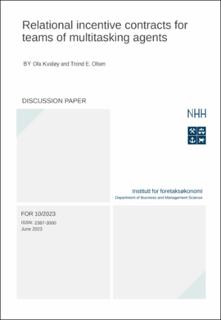Relational incentive contracts for teams of multitasking agents
Working paper

Åpne
Permanent lenke
https://hdl.handle.net/11250/3075322Utgivelsesdato
2023-06-30Metadata
Vis full innførselSamlinger
- Discussion papers (FOR) [566]
Sammendrag
We analyze optimal relational contracts for a group (team) of multitasking agents with hidden actions. Contracts are based on noisy signals that may be correlated across agents and between tasks. The optimal contract defines a performance measure in the form of an index (a scorecard) for each agent, and awards a bonus to the highest performing agent, provided his or her index exceeds a hurdle. An optimal index generally involves benchmarking against other agents, and this may, in combination with the hurdle requirement, introduce a cooperative element in the otherwise competitive incentive structure.
For agents with separate tasks and normally distributed signals, we find that strong correlation (either positive or negative) across agents is beneficial, while larger correlation within each agent's tasks is detrimental for efficiency, and that this has implications for optimal organization of tasks. For agents with common tasks the optimal contract may have features of both tournament and team incentives. The tournament aspect incentivizes an agent to exert effort on his own task, while the hurdle necessary to receive a bonus also incentivizes an agent to help his peers. In our setting this hybrid scheme can only be optimal if signals from agents' tasks are negatively correlated. Otherwise pure team incentives are optimal.